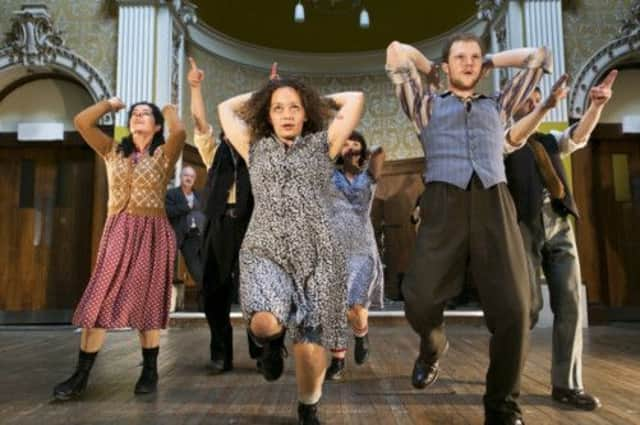Theatre review: In Time O’ Strife, Kirkcaldy


Pathhead Hall
****
“I must write about the world I know best,” he wrote, “the world of the working man and woman, their trials, loves, hates, suspicions, generosities and loyalties. I feel that it’s a contribution – I am doing what I know best, for the class that needs it now.”
The question of why Corrie’s play has had only two professional productions in Scotland in almost 90 years – one in John McGrath’s Clydebuilt 7:84 season of 1982, and now this new National Theatre of Scotland production – remains a troubling one. Yet although he was always wary of having his work adapted, it’s difficult to imagine that Corrie would not be delighted by the passion, the energy and the feeling for Scotland’s working-class history that informs this new music-theatre version by director and designer Graham McLaren, staged in an old church hall at Pathhead in Kirkcaldy, and interwoven with many of Corrie’s powerful poems, as well as music and songs by composer Michael John McCarthy and a three-piece band.
Advertisement
Hide AdWritten to raise money for strikers’ soup kitchens, In Time O’ Strife is a big, full-blooded domestic drama, strikingly similar in style to Sean O’Casey’s great Dublin plays of the same period. It tells the story of middle-aged miner Jock Smith and his family, of their neighbours, and of young Jenny Smith’s fiance Wull Baxter, an ambitious young man who becomes a strike-breaker, to Jenny’s despair. What’s perhaps most impressive about the play, apart from its powerful narrative drive, is its stubborn complexity: there’s hardly a man in the cast who does not harbour some degree of doubt about the strike and the terrible intensification of hardship it brings.
Perhaps the only fault of McLaren’s production is that there’s something in its atmosphere – its references via a screen to the miners’ strike of the 1980s and the decision to end with a fierce singing of the Red Flag – that slightly bypasses that subtlety. The play’s truthfulness about the double-edged quality of the strike weapon was courageous in 1926, and should be fully honoured now.
What McLaren’s production unleashes, though – in a small hall perfectly laid out and lit to recall an old living-room party or church-hall social – is a memorably angry, vivid and theatrical retelling of a vital story in Scottish history, with fiercely choreographed dance interludes by Imogen Knight, and a range of fine performances, notably from Ewan Stewart, Anita Vettesse and Hannah Donaldson as the Smiths and their oldest daughter.
It’s an exhilarating experience, this In Time O’ Strife, and not to be missed. Yet it also leaves behind a faint feeling of shame, that Scottish society once produced remarkable working-class writers like Corrie, with such a story to tell; and then allowed them to come so close to being completely forgotten.